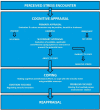Living with a left ventricular assist device: psychological burden and coping: protocol for a cross-sectional and longitudinal qualitative study
- PMID: 33087369
- PMCID: PMC7580038
- DOI: 10.1136/bmjopen-2020-037017
Living with a left ventricular assist device: psychological burden and coping: protocol for a cross-sectional and longitudinal qualitative study
Abstract
Introduction: Due to technological progress and persistent shortage of donor hearts, left ventricular assist devices (LVADs) have become established in the treatment of advanced heart failure. Accordingly, more patients live with LVADs for prolonged periods. Related research focused primarily on clinical issues and little is known about psychosocial aspects of living with an LVAD. This study aims to explore psychological burden and coping following LVAD implantation.
Methods and analysis: An exploratory qualitative study with cross-sectional and longitudinal elements will be carried out. At least 18 patients with LVAD who have the device implanted from a few weeks to more than 3 years will be interviewed in the cross-sectional component using an interview guide. A subsample of patients who live with the LVAD for up to 3 months when recruited will be interviewed two additional times in the following year. The cross-sectional interviews will be analysed using an inductive qualitative content analysis to describe psychological burden, coping resources and behaviour from the patient's perspective. Based on the findings, the longitudinal interviews will be analysed with a deductive content analysis to explore psychological adjustment during the first year after implantation. The findings will provide a deeper understanding of the complex and specific situation of patients with LVAD and of psychological adjustment to living with a life-sustaining implant. This can help clinicians in considering individual aspects to promote patient outcomes and is the basis for further research on healthcare interventions or technical solutions to reduce burden and for developing rehabilitation measures to promote psychosocial outcomes.
Ethics and dissemination: Ethical approval was obtained from the ethics committee of the School of Medicine and Health Sciences at the University of Oldenburg (2019-023). Study findings will be disseminated at national and international conferences and through peer-reviewed journals.
Trial registration number: German Clinical Trials Register (DRKS00016883).
Keywords: heart failure; qualitative research; rehabilitation medicine.
© Author(s) (or their employer(s)) 2020. Re-use permitted under CC BY-NC. No commercial re-use. See rights and permissions. Published by BMJ.
Conflict of interest statement
Competing interests: None declared.
Figures
Similar articles
-
Psychological burden and coping in destination therapy patients with a left ventricular assist device: A qualitative content analysis.Artif Organs. 2022 Jun;46(6):1165-1180. doi: 10.1111/aor.14158. Epub 2022 Jan 5. Artif Organs. 2022. PMID: 34932234
-
Quality of life and emotional distress early after left ventricular assist device implant: a mixed-method study.Artif Organs. 2015 Mar;39(3):220-7. doi: 10.1111/aor.12362. Epub 2014 Sep 10. Artif Organs. 2015. PMID: 25205291
-
Quality of life and psychological well-being during and after left ventricular assist device support.Clin Transplant. 2007 Sep-Oct;21(5):622-7. doi: 10.1111/j.1399-0012.2007.00698.x. Clin Transplant. 2007. PMID: 17845636
-
The current era of left ventricular assist devices.Future Cardiol. 2021 Sep;17(6):971-984. doi: 10.2217/fca-2020-0177. Epub 2021 Feb 10. Future Cardiol. 2021. PMID: 33563033 Review.
-
Left ventricular assist devices: A comprehensive review of major clinical trials, devices, and future directions.J Card Surg. 2021 Apr;36(4):1480-1491. doi: 10.1111/jocs.15341. Epub 2021 Jan 21. J Card Surg. 2021. PMID: 33476443 Review.
Cited by
-
Impact of Different Therapeutic Strategies With Left Ventricular Assist Devices on Health-Related Quality of Life During Prolonged Device-Based Support.Circ Rep. 2023 Jun 9;5(7):289-297. doi: 10.1253/circrep.CR-22-0126. eCollection 2023 Jul 10. Circ Rep. 2023. PMID: 37431516 Free PMC article.
-
Variation in Left Ventricular Assist Device Postdischarge Caregiver Requirements: Results From a Mixed-Methods Study With Equity Implications.Circ Heart Fail. 2022 Aug;15(8):e009583. doi: 10.1161/CIRCHEARTFAILURE.122.009583. Epub 2022 Jul 7. Circ Heart Fail. 2022. PMID: 35862012 Free PMC article.
References
-
- GBD 2015 Mortality and Causes of Death Collaborators Global, regional, and national life expectancy, all-cause mortality, and cause-specific mortality for 249 causes of death, 1980-2015: a systematic analysis for the global burden of disease study 2015. Lancet 2016;388:1459–544. 10.1016/S0140-6736(16)31012-1 - DOI - PMC - PubMed
Publication types
MeSH terms
Associated data
LinkOut - more resources
Full Text Sources
Medical


